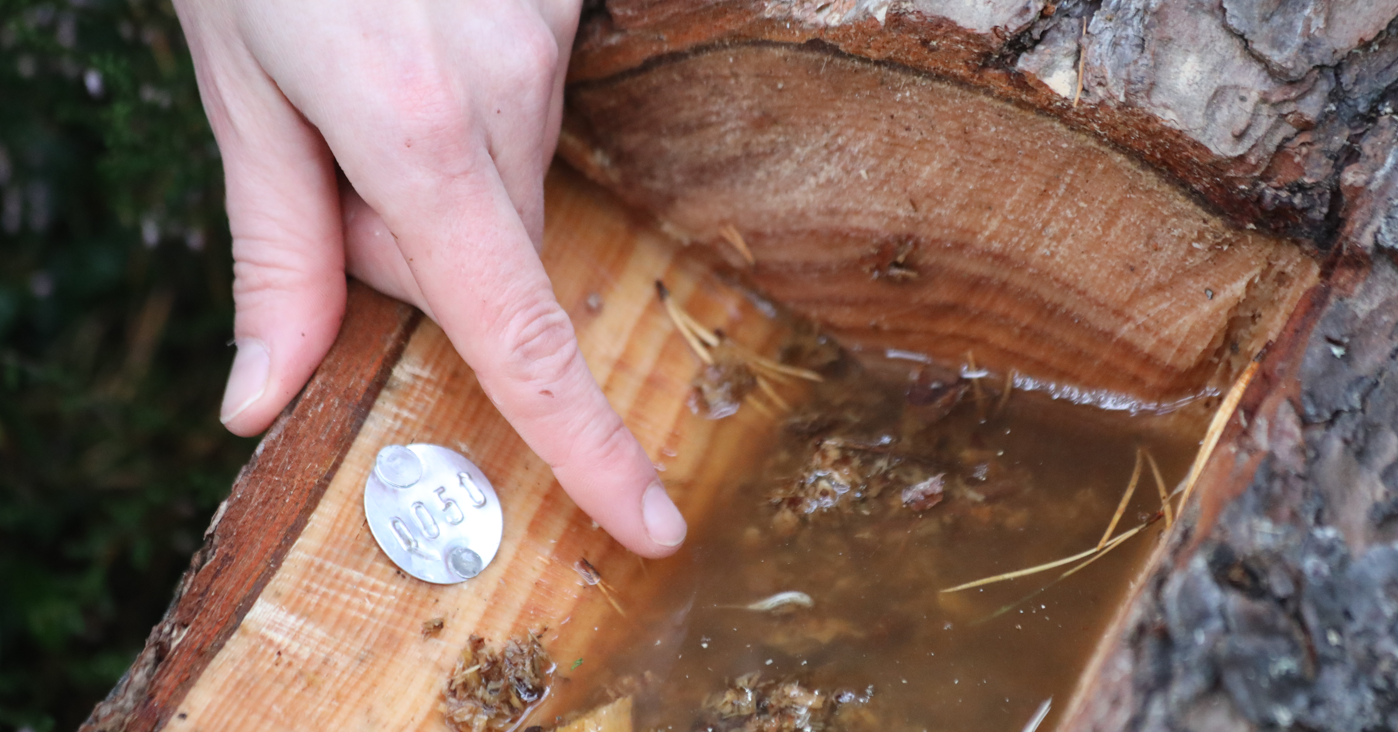Critically endangered pine hoverflies have been shown to be breeding successfully in new populations around the Cairngorms National Park thanks to conservation efforts by the Rare Invertebrates in the Cairngorms (RIC) partnership.
Surveys led by RIC found larvae in previously unoccupied tree stumps, meaning at least some of the pine hoverflies released by RIC partner the Royal Zoological Society of Scotland (RZSS) across three sites in October 2021 and March 2022 have completed a full breeding cycle, signalling a significant step forward for the species in Britain.
Dr Helen Taylor, conservation programme manager at RZSS said, “This a huge milestone for pine hoverfly conservation in Britain.
“We were delighted when RIC found adult pine hoverflies in the wild during the summer, but finding these larvae means we can now be certain that some of those adults found each other and found enough food to allow them to mate, lay eggs and produce a new generation at sites where this species has been missing for decades.
“These larvae mean we are seeing new populations emerge as a direct result of our wildlife conservation charity’s pine hoverfly breeding programme and the amazing habitat creation work that our partners at RIC and Forestry and Land Scotland (FLS) have been engaged in.”
Genevieve Tompkins, project officer at RIC said, “As one of Britain’s most endangered native species, pine hoverflies are vital to forest ecosystems, acting as both pollinators and waste recyclers. One of our aims to get more pine hoverflies in more places – restoring the species and returning the important functions they provide to native pine forests. Seeing these new populations starting to establish and breed represents very exciting progress towards that goal.”
Matthew Hawkins, conservation manager at Cairngorms National Park Authority said, “It’s great to see a key part of the Cairngorms Nature Action Plan having such success – the RIC project is an exemplar of how a scientific approach and partnership working can change the fate of an important species such as the pine hoverfly. With a quarter of the UK’s rare and endangered species being found in the Cairngorms National Park, projects like this are critical to ensure that the future of our unique wildlife is secure.”
Dr Taylor continued, “While this is an exciting step forward, our work and the work of the RIC partnership does not end here. We will continue the RZSS breeding programme for the flies at Highland Wildlife Park, learning from all the interesting observations we have been able to make during these surveys.
“In the coming months, we will also carry out additional staggered releases in partnership with RIC and FLS, as we attempt to ensure these new wild pine hoverfly populations are stable beyond this season’s success and thrive in the long-term.”
The Rare Invertebrates in the Cairngorms project is a partnership between RSPB Scotland, Cairngorms National Park Authority, RZSS, Buglife Scotland, Butterfly Conservation Scotland and NatureScot. The RIC project is currently funded by the RSPB and Cairngorms National Park Authority, with some of the habitat work funded by NatureScot’s Nature Restoration Fund
Funding for the RZSS breeding programme from Cairngorms National Park Authority, Forestry and Land Scotland, Marvelous Europe Inc., NatureScot, The National Geographic Society, alongside support from the Scottish Government’s zoos and aquariums fund and players of People’s Postcode Lottery, has been critical in ensuring this vital project can continue.
Related Members
-
News
.png?w=100&h=100&zc=1&f=jpeg&hash=60022dc0d0854fa23f80616d64c9376a) Sustainability in poetry - BIAZA Q&A with the author of The Rimba 17th February, 2026This week, BIAZA interviewed author Jane Griffiths and illustrator Emma Lokuciejewski on their recent book ‘The Rimba’ – a poetical…
Sustainability in poetry - BIAZA Q&A with the author of The Rimba 17th February, 2026This week, BIAZA interviewed author Jane Griffiths and illustrator Emma Lokuciejewski on their recent book ‘The Rimba’ – a poetical… -
News
.png?w=100&h=100&zc=1&f=jpeg&hash=49f40af79e569754bae2cce8fe8cd758) Binturong twins join big sister Boots at Drusillas Park 17th February, 2026Keepers at Drusillas Park are celebrating the birth of rare binturong twins, born on January 2nd, just months after their big sister Boots made history…
Binturong twins join big sister Boots at Drusillas Park 17th February, 2026Keepers at Drusillas Park are celebrating the birth of rare binturong twins, born on January 2nd, just months after their big sister Boots made history… -
News
.png?w=100&h=100&zc=1&f=jpeg&hash=97e6d151315c515d23f80e6ee9d1d533) Love is in the air as pygmy marmoset Tumble arrives at Shaldon Wildlife Trust 13th February, 2026Shaldon Wildlife Trust is celebrating a very small but very special love story this Valentine’s season with the arrival of a new female pygmy marmoset…
Love is in the air as pygmy marmoset Tumble arrives at Shaldon Wildlife Trust 13th February, 2026Shaldon Wildlife Trust is celebrating a very small but very special love story this Valentine’s season with the arrival of a new female pygmy marmoset…



